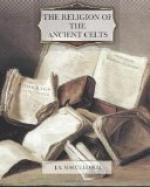The second battle took place twenty-seven years after the first, on Samhain. It was fought like the first on the plain of Mag-tured, though later accounts made one battle take place at Mag-tured in Mayo, the other at Mag-tured in Sligo.[171] Inconsistently, the conquering Tuatha De Danann in the interval, while Bres is their king, must pay tribute imposed by the Fomorians. Obviously in older accounts this tribute must have been imposed before the first battle and have been its cause. But why should gods, like the Tuatha De Danann, ever have been in subjection? This remains to be seen, but the answer probably lies in parallel myths of the subjection or death of divinities like Ishtar, Adonis, Persephone, and Osiris. Bres having exacted a tribute of the milk of all hornless dun cows, the cows of Ireland were passed through fire and smeared with ashes—a myth based perhaps on the Beltane fire ritual.[172] The avaricious Bres was satirised, and “nought but decay was on him from that hour,"[173] and when Nuada, having recovered, claimed the throne, he went to collect an army of the Fomorians, who assembled against the Tuatha De Danann. In the battle Indech wounded Ogma, and Balor slew Nuada, but was mortally wounded by Lug. Thereupon the Fomorians fled to their own region.
The Tuatha De Danann remained masters of Ireland until the coming of the Milesians, so named from an eponymous Mile, son of Bile. Ith, having been sent to reconnoitre, was slain, and the Milesians now invaded Ireland in force. In spite of a mist raised by the Druids, they landed, and, having met the three princes who slew Ith, demanded instant battle or surrender of the land. The princes agreed to abide by the decision of the Milesian poet Amairgen, who bade his friends re-embark and retire for the distance of nine waves. If they could then effect a landing, Ireland was theirs. A magic storm was raised, which wrecked many of their ships, but Amairgen recited verses, fragments, perhaps, of some old ritual, and overcame the dangers. After their defeat the survivors of the Tuatha De Danann retired into the hills to become a fairy folk, and the Milesians (the Goidels or Scots) became ancestors of the Irish.
Throughout the long story of the conquests of Ireland there are many reduplications, the same incidents being often ascribed to different personages.[174] Different versions of similar occurrences, based on older myths and traditions, may already have been in existence, and ritual practices, dimly remembered, required explanation. In the hands of the chroniclers, writing history with a purpose and combining their information with little regard to consistency, all this was reduced to a more or less connected narrative. At the hands of the prosaic chroniclers divinity passed from the gods, though traces of it still linger.
“Ye are gods, and, behold, ye shall
die, and the waves be upon you at
last.
In the darkness of time, in the
deeps of the years, in the changes of
things,
Ye shall sleep as a slain man sleeps,
and the world shall forget you for
kings.”




